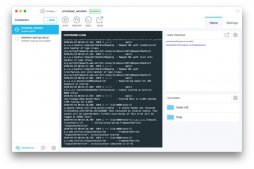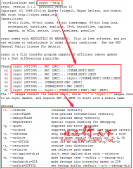Apache的commons-cli包是專門用于解析命令行參數(shù)格式的包。
依賴:
|
1
2
3
4
5
|
<dependency> <groupId>commons-cli</groupId> <artifactId>commons-cli</artifactId> <version>1.3.1</version></dependency> |
使用此包需要:
1.先定義有哪些參數(shù)需要解析、哪些參數(shù)有額外的選項、每個參數(shù)的描述等等,對應Options類
比如說一個命令行參數(shù)是 -hfbv,我們定義的Options的目的是,說明哪些參數(shù)是真正需要解析的參數(shù):如我們定義了Option:h、f、b,那么在解析的時候解析器就可以知道怎么去用定義的Option匹配命令行從而獲取每個參數(shù)。而且可以定義哪些參數(shù)需要選項,如tar -f ,f參數(shù)就需要文件名選項,通過定義解析器才可以把f后面的內(nèi)容解析為f指定的文件名。
2.根據(jù)定義的需要解析的參數(shù)對命令行參數(shù)進行解析,對應CommandLineParser類
根據(jù)定義的Options對象去解析傳入的String[] argus參數(shù),從而匹配出每個參數(shù),然后我們就可以單獨獲取每個參數(shù)。
3.解析完成返回CommandLine對象,由這個對象可獲取此次命令行參數(shù)的信息。
可以從這個對象中知道哪些參數(shù)輸入了,哪些參數(shù)沒有輸入,哪些參數(shù)的額外選項的內(nèi)容等等。然后我們就能自己寫代碼根據(jù)不同參數(shù)執(zhí)行不同邏輯了。
示例代碼:
|
1
2
3
4
5
6
7
8
9
10
11
12
13
14
15
16
17
18
19
20
21
22
23
24
25
26
27
28
29
30
31
32
33
34
35
36
37
38
39
40
41
42
43
44
45
46
47
48
49
50
51
52
53
54
55
56
57
58
59
60
61
62
63
64
65
66
67
68
69
70
71
72
73
74
75
76
77
78
79
80
81
82
83
84
85
86
87
88
89
90
91
92
93
94
95
96
97
98
99
100
101
102
103
104
105
106
107
108
109
110
111
112
113
114
115
116
117
118
119
120
121
122
123
124
125
126
127
128
129
130
131
132
133
134
135
136
137
138
139
140
141
142
143
144
145
146
147
148
149
150
151
152
153
154
155
156
157
158
159
160
161
162
163
164
165
166
167
168
169
170
171
172
173
174
175
176
177
178
179
180
181
182
183
184
185
186
187
188
189
190
191
192
193
194
195
196
197
198
199
200
201
202
203
|
import java.io.File;import java.io.IOException;import java.util.ArrayList;import java.util.Arrays;import java.util.HashSet;?import org.apache.commons.cli.CommandLine;import org.apache.commons.cli.CommandLineParser;import org.apache.commons.cli.DefaultParser;import org.apache.commons.cli.HelpFormatter;import org.apache.commons.cli.Option;import org.apache.commons.cli.Options;import org.apache.commons.cli.ParseException;?import com.lwt.util.DirUtil;?public class CommandLineUtil { private String[] args; private Options opts = new Options(); private File keyFile; private boolean encrypt; private boolean create; private boolean enName; private File[] files; private File[] dirs; public File getKeyFile() { return keyFile; } public boolean isEncrypt() { return encrypt; } public boolean isEnName() { return enName; } public boolean isCreate() { return create; } public File[] getFiles() { return files; } public File[] getDirs() { return dirs; }? public CommandLineUtil(String[] args) { this.args = args; definedOptions(); parseOptions(); duplicate_removal(); } // 定義命令行參數(shù) private void definedOptions(){ Option opt_h = new Option("h", "Show this page."); Option opt_e = new Option("e", "encrypt", false, "Encrypt file."); Option opt_d = new Option("d", "decrypt", false, "Decrypt file."); Option opt_c = new Option("c", "create", false, "Create new key file."); Option opt_n = new Option("n", "name", false, "Encrypt file name."); Option opt_k = Option.builder("k").hasArg().argName("keyFile") .desc("Specify the key file").build(); Option opt_f = Option.builder("f").hasArgs().argName("file1,file2...") .valueSeparator(',') .desc("A files list with ',' separate to handle").build(); Option opt_r = Option .builder("r") .hasArgs() .argName("dir1,dir1...") .valueSeparator(',') .desc("A directories list with ',' separate to handle its child files") .build(); Option opt_R = Option .builder("R") .hasArgs() .argName("dir1,dir1...") .valueSeparator(',') .desc("A directories list with ',' separate to recurse handle child files") .build(); opts.addOption(opt_n); opts.addOption(opt_c); opts.addOption(opt_k); opts.addOption(opt_h); opts.addOption(opt_e); opts.addOption(opt_d); opts.addOption(opt_f); opts.addOption(opt_r); opts.addOption(opt_R); } // 解析處理命令行參數(shù) private void parseOptions(){ CommandLineParser parser = new DefaultParser(); CommandLine line = null; // 解析命令行參數(shù) try { line = parser.parse(opts, args); } catch (ParseException e) { System.err.println(e.getMessage()); System.exit(1); }? // 若指定h則顯示幫助 if (args == null || args.length == 0 || line.hasOption("h")) { HelpFormatter help = new HelpFormatter(); help.printHelp("encrypt", opts); }? // 選擇加密或解密操作,默認是加密文件 if (line.hasOption("d")) { if (line.hasOption("e")) { System.err .println("The -e and -d option can't specify at the same time."); System.exit(1); } encrypt = false; } else { encrypt = true; if(line.hasOption("n")){ enName = true; } } if (line.hasOption("k")) { String k = line.getOptionValue("k"); File file = new File(k); if (line.hasOption("c")) { keyFile = file; create = true; }else { if(file.isFile()){ keyFile = file; } else{ System.err.println(file + " is not a available key file"); System.exit(1); } } }? ArrayList<File> files = new ArrayList<File>(); ArrayList<File> dirs = new ArrayList<File>(); if (line.hasOption("f")) { String[] fs = line.getOptionValues("f"); for(String f : fs){ File file = new File(f); if(file.isFile()){ files.add(file); }else{ System.err.println(file + " is not a file"); System.exit(1); } } }? if (line.hasOption("r")) { String[] rs = line.getOptionValues("r"); for(String r : rs){ File dir = new File(r); if(dir.isDirectory()){ dirs.add(dir); DirUtil dirUtil = new DirUtil(dir); files.addAll(Arrays.asList(dirUtil.getFiles())); dirs.addAll(Arrays.asList(dirUtil.getDirs())); }else{ System.err.println(dir + " is not a directory"); System.exit(1); } } }? if (line.hasOption("R")) { String[] Rs = line.getOptionValues("R"); for(String R : Rs){ File dir = new File(R); if(dir.isDirectory()){ dirs.add(dir); DirUtil dirUtil = new DirUtil(dir); files.addAll(Arrays.asList(dirUtil.getAllFiles())); dirs.addAll(Arrays.asList(dirUtil.getAllDirs())); }else{ System.err.println(dir + " is not a directory"); System.exit(1); } } } this.files = files.toArray(new File[0]); this.dirs = dirs.toArray(new File[0]); } public void duplicate_removal (){ HashSet<File> fileSet = new HashSet<File>(); for(File file : files){ try { fileSet.add(file.getCanonicalFile()); } catch (IOException e) { System.err.println(e.getMessage()); System.exit(1); } } files = fileSet.toArray(new File[0]); fileSet = new HashSet<File>(); for(File dir : dirs){ try { fileSet.add(dir.getCanonicalFile()); } catch (IOException e) { System.err.println(e.getMessage()); System.exit(1); } } dirs = fileSet.toArray(new File[0]); }} |
總結
以上所述是小編給大家介紹的使用Apache commons-cli包進行命令行參數(shù)解析的示例代碼,希望對大家有所幫助,如果大家有任何疑問請給我留言,小編會及時回復大家的。在此也非常感謝大家對服務器之家網(wǎng)站的支持!
原文鏈接:https://blog.csdn.net/xuejianbest/article/details/80404971















